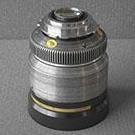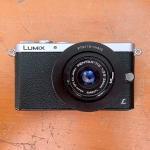Leaderboard
Popular Content
Showing content with the highest reputation on 02/21/2015 in all areas
-
You know, I've been binge-watching a whole bunch of movies on Blu-ray this past week. From classics like Princess Bride to modern blockbusters like Nolan's Dark Knight trilogy. Not once have I gone, what nicely isolated background blur is in the scene. In fact many of the movies I liked don't even use that much shallow depth of field, and it's clear that the lens has been stopped down some. I think on the whole we're looking at 5-10% of the scenes at most? What's really more obvious to my perception I think, in the technical aspects of the camera itself, are things like dynamic range and colour response (as we all know, with this will affect the final grade and compressed footage makes this even more challenging), how camera movement is handled, and skill taken in focusing (1080p is not forgiving for errors in older films, 4K is going to be less so). The example above illustrates my point: The one stop difference in DoF, if not placed side-by-side, wasn't going to be something I would have commmented about, and wouldn't have made me prefer one image over the other.2 points
-

FULL FRAME or SUPER 35 - What do you prefer and why?
Caleb Genheimer and one other reacted to Hans Punk for a topic
Easy....70mm2 points -
From http://eddavid.tumblr.com/post/111 I was told I had to redo my W9 income tax form, because the form I filled out was the Nov 2013 form, which was expired. So I went and filled out the Dec 2014 form and noticed something new - a whole extra page of paperwork - It went from a three page document to a four page document - and that’s our government, the king of bureaucracy, in action. Bureaucracy was the big theme in this month’s Harpers, currently my favorite magazine of all time, up there with the Atlantic and the Week and the New Yorker as what I read (sorry novels, I haven’t read you guys in a while and maybe that’s another essay to write about next). In this issue, they mentioned that bureaucracy also bleeds into the arts, which is my field of work as a cinematographer. The use of credentials - like a police chief or military commander or certified doctor - a practice that exists in places like Soviet Russia have fallen into our field. The highest esteemed titles, like DGA or ASC even go after your name on a movie title (also the only art industry in the world where you put the credits on an advertisement for the product - does Colgate Toothpaste do that?) Saying “Joe Schmoe, ASC” does that make Joe Schmoe more certified than his name without that title? Does it make the film any less beautiful? At what point in the arts are you certified as an artist? At what point can you say, “yes I know what I am doing.” Some great artists do their best work before they “become” recognized. A lot of famous artists reminisce about how much easier it is for them to create good art before they are lauded, such as Jackson Pollock. Once he was called by Life Magazine, “is this the greatest artist of our generation?” his life suffered immensely. My theory is, you are an artist when you create art. So anyone is an artist, if they put pen to paper, dirty finger to keyboard. But in our filmmaking industry my whole life I have felt guilty because I didn’t go to a film schoo, I didn’t get certifiedl - I went to a liberal arts college and was an anthropology major and almost a film studies minor, as well as one point a music major. I didn’t have the training everyone seemed to be whispering that I needed. I felt so guilty, that I didn’t know how to load a film mag, that I didn’t ever sit down and learn lighting or even lenses. I had no photography background - that was my sister. I didn’t know the difference between a wide angle lens and a telephoto lens, surrounded by many people who did. I didn’t know soft light vs hard light, or the angle of lighting and how it changes on a face in shadows. I grew up shooting documentaries and prank videos on VHS-C cameras - made one in high school called “perspective” and interviews young people, older young people, and my parents about various historical issues like the Vietnam war, trying to show how our age affects how we interpret history, as well as education level, etc - bigger issues I didn’t address like race and class, because, well, I grew up in the wonderful safe bubble of Fairfield, CT. I didn’t light it - I didn’t think about the aesthetics of it at all, just what I was trying to say. But that guilt of me not having the credentials for filmmaking has haunted me for so long. I would show up on set and be so nervous that I didn’t know anything about lighting - or 35mm film or real lenses - that I would call for the wrong lens - that I was being judged by everyone. I remember about 7 years ago or so I was on a low budget tv spec spot and an electric asked me my age and I think I said I was older than I was so I could pretend that I knew what I was doing. But the more I do cinematography, the more I know that whatever unique perspective I have is an advantage. Not going to film school, coming from an anthropological and philosophical perspective gives me strength, a different way of seeing. And it is skills that can actually be learned on the job, online on forums, by talking and observing and learning from others. I have learned so much about filmmaking from a vimeo series called “Every Painting a Frame” that is just some passionate film editor named Tony Zhou doing it on his own time as from a youtube series spoofing George Lucas, and of course on set mentors like the great DP David Tumblety I shot with a few times. Everyone who brings a fresh perspective to filmmaking is so needed - we can not just have people do films all the same way. I think more and more there is a gluttony of film set behaviors that rewards the same and bureaucratic method of making “films” - traditional, boring, waiting - not just trying to find moments and capture little tiny ideas and bigger thoughts - but this route system of regimented military-like crew that does things traditional ways that people like Paul Thomas Anderson rally against - no marks - no lets go overt here instead - untraditional approaches that open up wonder again. But also that wonder is not anything without intense concentration and commitment and hard work. You can’t be lazy and successful. It’s sweat. My Puritanical work ethic was at one point rewarded vastly by my former boss and greatest mentor, Joe Baron. He runs Attitude, Inc - a post house in New York City. He taught me about perseverance - about going for perfection - “crossing the finish line” - which would sometimes be at 3am to get a piece to a level of standard he believed in. To not be mediocre, no matter what anyone else believes - to put one’s full heart into anything. To not get upset and bogged down by bureaucratic methods - to just be a part of a small group of people and be passionate. He found my strengths, and didn’t make me feel bad about my flaws, my quirks. I didn’t learn this in school, and this mentorship under him, as I assistant edited under him for two years. And his voice has been guiding me ever since, as I navigate through my adulthood. And whoever I get down because maybe I switch a lens too late or change my mind too suddenly (all artists need to be open to changes that can occur at any moment - spontaneity) - I always think of him there, watching over, making sure I’m okay.1 point
-
in Filmmaking, it's good to not know what you are doing.
Ivar Kristjan Ivarsson reacted to Ed_David for a topic
I agree completely John - I think following textbook examples of how to do things vs developing a style of doing things are different - it's dogmatic "filmmaking" vs "untraditional" and sometimes both ways can lead to a different product. One can be more "factory-line" and the other more "artistic" - whether one is better is completely subjective. But each director and crew work differently, and I am saddened by on-set behaviors thinking that there is only one way to make a movie. There is not. And many of the best doc filmmakers fell into it. For instance, Errol Morris, started as a private investigator. Creativity happens at all levels - and the give and take between an actor and director is highly important, as well as the collaboration between crew and director. And yes a good script can get by with weak performances, and vice versa, but it's only when all the elements come together - story, acting, cinematography, sound, editing - that I feel one is watching a film of brilliance. All art may or may not follow these principles. But again there is no right way - it's art. It's in the realm of the subjective. I think that Lawerence of Arabia is one of the greatest films of all time, as well as the 400 Blows - but on several occasions I have had friends tell me how boring they think both films are. And that's the point - that no one can say in art what is good art and bad art. It's all a matter of opinion.1 point -

FULL FRAME or SUPER 35 - What do you prefer and why?
Nick Hughes reacted to richg101 for a topic
I suppose the reason for the difference is that generally from what I see an 85mm at f2.8 is almost always sharper than a 50mm at f2. Since the 85mm will be used on full frame, the full frame setup has the advantage in sharpness of the in focus subject. as a result the actual ratio between in focus and out of focus is greater. Also, from my experiences using usually full frame lenses on both full frame and aps-c/s35 on a full frame sensor the whole image circle is being utilised to deliver the sensor resolution. Assuming a full frame lens wide open will resolve 30lp/mm on a full frame sensor the horizontal resolution 36mm x 30x30 = 2160px. crop into that for s35 and you only have 1440px of horizontal resolution. So assuming the actual lenses are full frame lenses - an 85mm on the full frame sensor, and a 50mm on a s35 sensor, the 50mm will project the same fov as the 85mm but the actual overall line pairs is divided by 1.5 on s35. The difference is less obvious when true s35mm lenses are used on the frame they're designed for. The sigma 18-35 f1.8 for example will outresolve most full frame lenses. Then we have speed boosters - which compress the resolution down onto a smaller area, so if there was a 'optically perfect' speed booster available you could take the 30lp/mm full frame lens and compress it by the 0.7x and have around 45lp/mm of resolving power onto your s35 sensor. Unfortunately no commercially available speed boosters allow optical perfection so some of the lens resolution is lost. Still the delivered resolving power onto the s35 sensor is normally more from a 50mm + speed booster than the resolution from a 35mm lens without a focal reducer. The only real way to properly illustrate the difference would be to take a m4/3 camera and a 25mm lens and put it against a 645 camera and an 80mm lens. The 80mmbeing set at f2.8 and the 25mm lens having to be set at something like f0.7 to get the same amount of defocus. Quite obviously the 80mm will blow the 25mm lens out of the water in terms of sharpness.1 point -
I think what I wrote relates deeply to a lot of people - that we seem to feel we need to be "accredited" to be artists, when the reality is that you are an artist if you do art - just as you are a runner if you run. And I think this is an issue to speaks to many people. This isn't purely navel-gazing. Also it's about the psychologogy behind filmmaking. But one could also argue that all personal essays or biographies are better left to oneself. And that's fine to feel that way. It's a topic that has existed since human communication started.1 point
-

Great looking GH4 footage
nahua reacted to fuzzynormal for a topic
Yeah, I don't know why people get their panties knotted about certain digital cameras not looking cinematic enough. These are judgements based on what exactly? Vimeo or YouTube videos from amateur goofballs like me slapping a kit lens on a camera body, lazily applying some ill-conceived color grade, and uploading it? Jeeze, if it looks too "digital" to you, change the lens, change how you shoot, change the color grade. Okay, maybe a certain camera gets you closer to a subjective cinema-look to start, but it's still up to you to finish the job. If you can't find a recipe to make your shots cinematic, you're doing it wrong, not the camera. I'll guarantee you someone with talent and skill could grab my modest Panasonic GM1 and make visually stunning shots while I could run around all day with an Alexa and create a pile of worthlessness if I didn't know what I was doing. Too much worrying about the wrong stuff when it comes to cameras, I think.1 point -

The future of cameras and slomo: how does 1 Trillion frames per second sound?
Axel reacted to Nick Hughes for a topic
Jodorowski is the first to pop into my mind. Still, I don't think psychedelic usage is exactly a well-kept secret in any of the creative fields.1 point -
So who of the greatest film directors has used hallucinogens before? Has somebody confessed yet? This is quite interesting by the way. I think in the creative field, using hallucinogens gives you an edge, someone disagrees ?1 point
-
Interesting thread and good remarks. I always felt that people who call for higher frame rates subconsciously want to stop motion. On the relativity of time (and the perception of time) I once read a good book (I think the title was Time). The author said that if you were sucked into a black hole, this would happen so fast that you wouldn't notice how all your molecules were compressed. A guy with a very good telescope, watching the tragedy from earth, would see you hovering in front of the abyss completely motionless. Every now and then, becoming old and grey, he would check the status quo, but wasn't able to tell if you moved forward at all. The heart of moving pictures is present constantly slipping away. Fleeting moments. Best captured at lower frame rates. Not long ago (relatively) I watched an experimental film about motion blur (title was motion blur). Time lapse with successively longer exposure times. Made the cars on a highway disappear, made the fish in a fish tank disappear. A trillion fps will make us see light move, but will practically turn any living thing to stone.1 point
